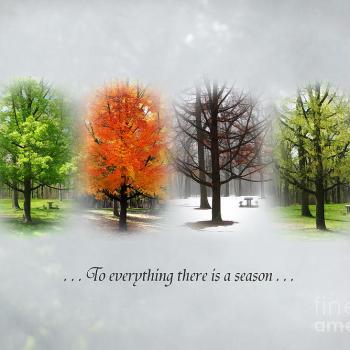Editors' Note: This article is part of the Patheos Public Square on the Faith and Aging. Read other perspectives here.
Recently, we've seen a spirited conversation in public life about aging, death, and dignity. Many American states, with measures on the ballot this November, are racing to catch up to Europe where many countries allow euthanasia, even, as in Belgium, child euthanasia.
This movement, to make the end of life easier on those with terminal illnesses or to help the aging eliminate years of expensive care and a painful existence, is a reflection of our rebellion against what we know is true: the possibility of disease and the inevitability of death. But the Christian story has much more to offer those who face terminal illness than the false hope of a swift and clinical solution.
The Christian story both acknowledges the reality of illness, pain, and death and offers the most radical rebellion against this fierce and cruel enemy. First, the Bible tells us that the world was once good and beautiful, created by the intricate design of a loving Creator. But something happened that not only corrupted even the most noble of human hearts but the very cosmos in which we reside. Sin has pervaded every aspect of human existence and is the source of disease and pain and death—not specific sins by those who suffer, but sin as the evil and corrupting decay upon a beautiful world.
But this same Christian story tells us that God, in his Son Jesus Christ, conquered sin and death and grave and is renewing and restoring the world. This radical rebellion against the cosmic evil powers offers more than a temporary staving off of the inevitable, it offers a completely new world, a new creation, and yes, new and uncorrupted bodies.
The Christian faith offers resources for those who suffer. In Jesus, we have a friend, who wept in bitter anger at the death of his friend Lazarus. In Jesus we also have the eternal Son of God, the Creator who reverses the curse and raises the dead to new life. In Jesus we have the Good Shepherd who offers us himself in the midst of deep and dark and debilitating pain.
Paul wrote that it is this eschatological hope that helps Christians endure the pangs of death in this corrupted world:
But we have this treasure in jars of clay, to show that the surpassing power belongs to God and not to us. We are afflicted in every way, but not crushed; perplexed, but not driven to despair; persecuted, but not forsaken; struck down, but not destroyed; always carrying in the body the death of Jesus, so that the life of Jesus may also be manifested in our bodies. For we who live are always being given over to death for Jesus' sake, so that the life of Jesus also may be manifested in our mortal flesh. So death is at work in us, but life in you (2 Corinthians 4:7-12 ESV).
Christians oppose euthanasia for several reasons. We oppose it because we believe, as the Scriptures remind us, that every human life has unique value and worth, regardless of its utility (Genesis 2:26; Genesis 9:3). We oppose it because so often the "death with dignity" industry preys on the vulnerable. But we oppose euthanasia mostly because if offers cheap promises of hope that offer far less than we find in the gospel's beautiful story of cosmic and bodily redemption.
This future hope informs not simply the way we feel about euthanasia, but how we treat the elderly in our midst. It reminds us that God doesn't measure value the way we are so often tempted to measure it—by youth, attractiveness, and physical abilities. There is no season of life that erases the image of God in humans. Even those who would reject euthanasia are often unwitting evangelists for its utilitarian arguments. When we prioritize youth and attractiveness and marginalize the elderly, we are communicating a message far different than the Christian gospel.
What's more, though we, in Christ, rebel against the enemy of sin and death, the aging process offers us fresh opportunities to grow. The elderly, once viral and independent, now learn a fresh dependence on others. And the young and viral can find new ways to serve the older generation. Both those who need care and those who offer it can grow in character. But a society that seeks to airbrush the reality of aging and death from its collective conscience, is a society that makes a twisted sense of beauty and usefulness its god. This Darwinian utopianism always ends with a cruel targeting of the vulnerable, who are seen as obstacles to the perfect society.
Jesus offers the world something better, something different, and a utopia fulfilled only in his radical defeat of sin and death. His very undignified death leads to our own death with dignity.
11/16/2016 5:00:00 AM





